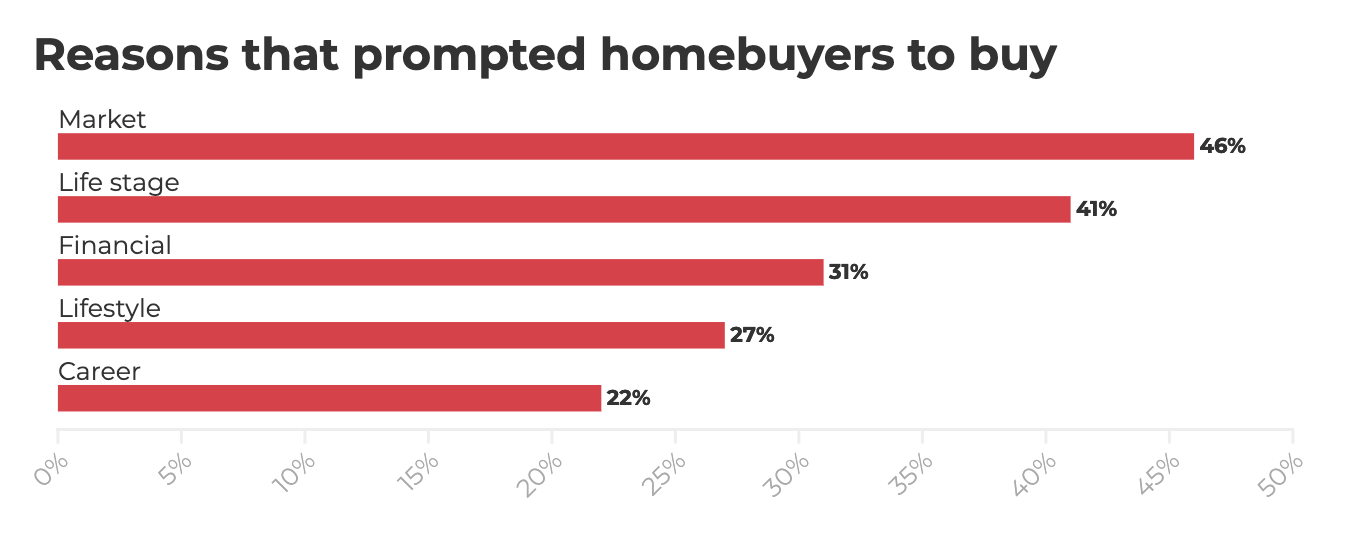Current Location: Local Lifes Local News Record low rates and FOMO key drivers of buyer surge: new survey
Realestate.com.au’s latest Property Seeker report, which involved an online survey of 6700 Australians in December 2020, showed market conditions led by low rates and government incentives are now the key driver of the unprecedented buyer demand.
Realestate.com.au director of economic research Cameron Kusher said FOMO was very real as buyers rushed to take advantage of record low mortgage rates.
What's important to Aussie homebuyers?
“We are seeing record high volumes of people searching for properties and our index of demand, which measures high-intent buyers, is also close to an historic high,” Mr Kusher said.
“We’re also seeing property prices rising throughout the country at a fairly rapid pace in many areas.
“I believe that FOMO is real at the moment and a strong driver of purchasing behaviour.”
Unprecedented buyer demand, record low interest rates and a low volume of stock for sale have pushed prices higher, with the REA Insights Home Price Index Report showing a 5.9% rise in dwelling prices over the past year.

Low rates, record buyer demand and low supply have pushed house prices higher. Picture: realestate.com.au/buy
A number of economists have forecast property prices will grow by 5-10% both this year and next, with some forecasting a sustained housing boom and 20% growth by the end of 2022.
“Although borrowing costs are likely to remain low for some time, for many buyers I sense a concern that the longer they wait to purchase the more expensive things are going to get,” Mr Kusher said.
“For buyers that have recently sold, the longer they are out of the market the more capital growth they continue to miss out on,” he added.
Realestate.com.au market research and insights manager Kirstin Hodgson said market conditions, mostly low interest rates and government grants, are now the number one factor prompting Australians to consider buying a property.
“In contrast, last time we conducted the research in 2019, Australians were prompted by life stage changes, such as starting a family, children flying the nest, or taking the plunge and moving in with a partner,” Ms Hodgson said.

Market influences had the biggest impact on buying considerations this time, nominated by 46% of survey respondents.
Life stage came in second (41%), followed by financial reasons (31%) such as salary changes or wealth creation. A lifestyle change was a factor for 27% of respondents, while 22% pointed to career reasons such as starting out, retiring or losing a job.
The main market factor was low interest rates, which were prompting one in four buyers to consider buying property.
The survey – an in-depth study of property consumers in Australia – showed government grants and schemes were particularly strong influences for first-home buyers.

Interest rates are a key driver of the strong housing demand. Picture: Getty
Mr Kusher believed interest rates were an even stronger overall driver of the current levels of housing demand.
“Historically we have seen that as interest rates fall, demand for properties rise and that is playing out once more with borrowing costs now at the lowest levels on record,” he said.
While the Reserve Bank of Australia has ruled out an early rate rise before 2024, economists believe the Australian Prudential Regulation Authority will introduce macroprudential ‘speed limits’ later this year or next year if lending standards deteriorate.
Economists have also suggested fixed mortgage rates may increase later this year.
COVID has led to a significant change in what people want in a home, including a shift in preferences towards houses and away from apartments.
“While Australian homes have always been large and had excess bedrooms, with more people working from home more often, what they want in a home has become even more imperative,” Mr Kusher said.





‘Stop complaining’: millionaire property investor defends plan to buy 1000 homes
Queensland set to make border announcement on Monday as vaccine rates soar
Face masks could remain mandatory in NSW after December 15
Disney World puts COVID vaccine mandate on hold after cast member released internal memo
